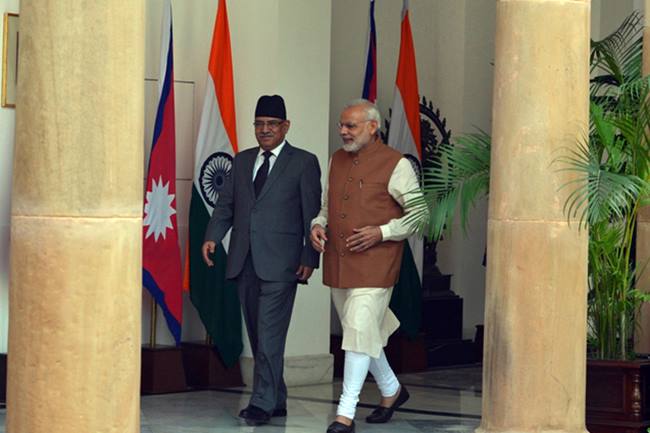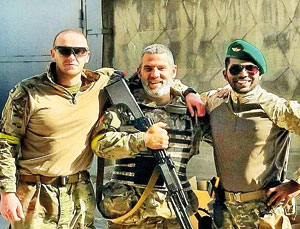New Delhi/Kathmandu, September 19 (NIA): The Nepalese Prime Minister Pushpa Kamal Dahal, who returned to Kathmandu on Sunday after a four-day visit to India, is expected to take a soft line on the issue of accommodating the demands of the Madhesi community in the implementation of the new constitution.
When he met Indian Prime Minister Narendra Modi on Friday, Modi urged Dahal to ‘accommodate the aspirations of all sections of diverse (Nepali) society’ in the new Constitution.
This is a direct reference to the new constitution that was promulgated by the Constituent Assembly last year but which led to unrest in the Tarai and a five-month Indian blockade.
Modi said at a joint press conference with Dahal that implementing the Constitution would only be possible through an “inclusive dialogue”.
“Under your wise leadership, I am confident that Nepal will be successful in implementing the Constitution,” Modi said. “I wish you a success in this endeavor.”
Modi also hailed Dahal as “the catalytic force for peace”, and praised his role in strengthening democratic institutions in Nepal. In turn, Nepal’s Prime Minister thanked his Indian counterpart for the “warm welcome and generous hospitality”, and said the ‘kind words … mean a lot for me and my country”.
Dahal told the press meet that his government has made “serious efforts to bring everyone on board, as we enter the phase of constitution implementation in the interest of all sections of Nepali society”.
This is Dahal’s second state visit to India as Nepal’s Prime Minister after 2008. In 2008, he ignored India’s advice and unsuccessfully tried to sack the Army Chief in a bid to capture state power. As a result, he had to resign. His party split into multiple factions and it suffered a humiliating defeat in the second Constituent Assembly elections in 2013.
It took Dahal eight years to return to power, this time with support from India which urged the Maoists and the Nepali Congress to dump the UML-led government of Prime Minister K P Oli three months ago.
Oli was perceived as yielding to Chinese overtures in Nepal following the blockade. He had also signed a trade and transit treaty with Beijing.
Oli had also invited Chinese President Xi Jinping to Nepal. After Oli’s ouster, Xi’s visit to Kathmandu is in limbo. Instead, Dahal has invited India’s President Pranab Mukherjee to Nepal.
Political analysts say that India is uncomfortable with China’s growing influence in Nepal, and Modi is believed to have asked Dahal to keep some distance from Beijing. At the press meet, Dahal assured Modi that “Nepal fully supports India’s aspirations for a greater role in international institutions”.
Nepali Times Commentator Om Astha Rai writes that in September 2008, when Dahal went to Delhi first as Prime Minister, he said: “Trust me.” This time too he told the Indians, “Trust me”.
Eight years ago, Dahal was given a rousing welcome in New Delhi though some were miffed that he visited Beijing first. But he was admired for transforming himself from being a Maoist guerrilla commander to an elected Prime Minister. The Indian media couldn’t get enough of him.

However, there was some skepticism of his commitment to parliamentary democracy and the free market. Dahal tried hard to convince Indian investors that he was a man they could do business with. But it was his step-by-step attempt to grab absolute power when he returned that soured his relations with India and ultimately led to his resignation in 2009.
It has taken him eight years to be accepted enough to make another visit to Delhi regain trust.
Nepal’s former ambassador to India, Lokraj Baral, says Dahal needs to talk less and work more to show that he has matured. He needs to try to reconstruct Nepal-India relations from its post-blockade low.
“India has its own interests, but the current trust deficit between Kathmandu and New Delhi is the result of our failure to put our own house in order,” Baral said. “He will gain India’s trust if he addresses Madhesi grievances by amending the Constitution.”
Dahal justified his party’s defection from the United Marxist Leninist (UML) coalition, by blaming the KP Oli government for not solving the Madhes crisis. But he failed to register a constitution amendment bill in the Parliament ahead of his India visit, and Madhesi parties are now angry and suspicious.
Dahal needs the support of the UML to meet the Madhesi demand for a constitutional amendment, and needs to balance relations with India and China. He already seems to have annoyed Beijing by inviting Indian President Pranab Mukherjee to Kathmandu before the official visit of the Chinese President Xi Jinping to Nepal, and by his indifference towards implementing the trade and transit treaty with China.
The Ministry of Foreign Affairs has denied that Xi’s visit is cancelled, but it has not confirmed it either.



























































